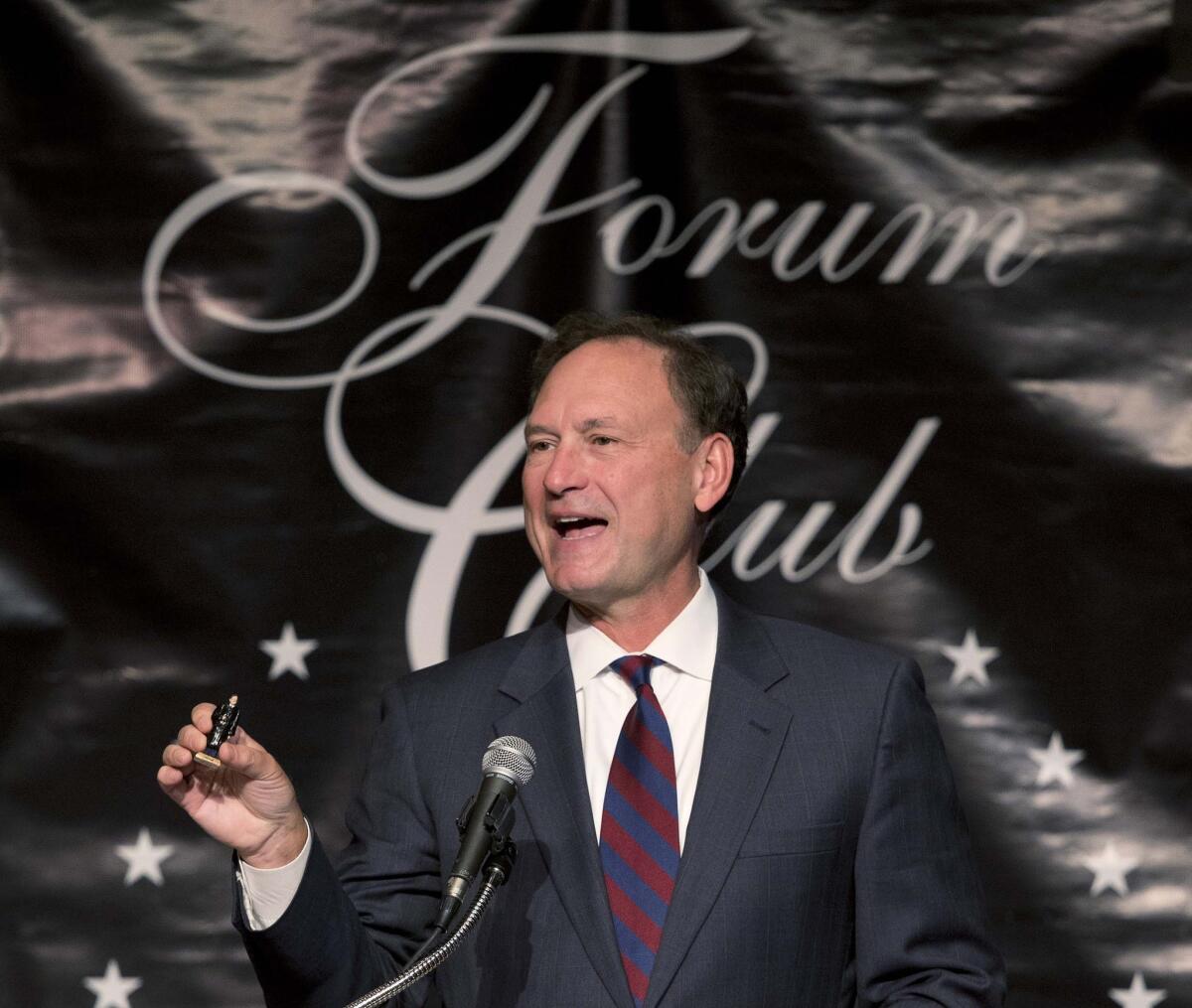Supreme Court: Yes, (some) corporations can pray--and you’ll all pay

Supreme Court Justice Samuel Alito: Opening doors for religious exemptions of all sorts?
- Share via
In its decision Monday in the Hobby Lobby case, the conservative Supreme Court majority that upheld corporations’ religious objections to birth control spends an inordinate amount of time defending itself from the reasoning and wrath of Justice Ruth Bader Ginsburg’s dissent.
Justice Samuel Alito, whose name is on the decision, alludes no fewer than 24 times to the “principal dissent,” which Ginsburg wrote for the four-member minority. Plainly, he felt Ginsburg’s powerful intellect breathing down his neck as he tried to find a path to upholding the Hobby Lobby parties’ attack on women’s rights without expanding corporate “personhood” too much.
He failed. Ginsburg concisely labels Alito’s ruling one of “startling breadth,” pointing out all the doors it opens to religious claims by business owners trumping the rights of their employees. She also observes that the majority’s answer to allowing business owners to opt out of covering their employees’ legitimate health needs is that “the general public can pick up the tab.”
In other words, the decision gives business owners the right to weasel out of their legal obligations by sticking you and me with the bill.
The Hobby Lobby case, as we reported earlier, has been percolating for months as yet another corporate challenge to the Affordable Care Act. It was brought originally on behalf of the pious owners of that privately held crafts chain, along with other private businesses. They asserted that their religious convictions were trampled by the Affordable Care Act’s mandate that medium and large employers cover contraceptives for their female employees without cost sharing — that is, without co-pays and deductibles.
The businesses pointed to a 1993 federal law, the Religious Freedom Restoration Act, which prohibits the government from imposing a “substantial burden” on a person’s exercise of religion, even in a generally enforced law. The court majority ruled that the law effectively preempts the contraceptive mandate in the ACA.
Eric Posner of the University of Chicago law school contends that, to the extent the majority relied on the RFRA, “Alito’s legal argument is stronger than Ginsburg’s.” But the law itself, he says, “is pretty dumb.”
Alito maintains that his decision is narrow, applying only to contraceptives, and only to “closely-held” companies — that is, not to publicly traded corporations.
Ginsburg doesn’t buy it. She asks how the ruling can be differentiated from those in which business owners pose religious objections to granting insurance coverage for “blood transfusions (Jehovah’s Witnesses); antidepressants (Scientologists); medications derived from pigs, including anesthesia ... and pills coated with gelatin (certain Muslims, Jews, and Hindus); and vaccinations (Christian Scientists, among others).” She concludes, “the Court ... has ventured into a minefield.”
Indeed, Alito himself acknowledges that “other coverage requirements, such as immunizations ... may involve different arguments about the least restrictive means of providing them” — that is, exempting the employer, and letting government step in.
To a great extent, the decision turns on whether a business is a “person.” This is the same minefield the court seeded in its infamous Citizens United case in 2010, when it held that campaign finance laws limiting corporate contributions violated corporations’ free-speech rights. The detonation of those mines has laid waste to the electoral process, turning it into a playground for corporate interests. (More of a playground, anyway.)
Here the court’s majority rules that a privately held company is, in effect, a “person” that can express religious convictions. Alito sugarcoats that finding, acknowledging that corporate personhood is a “fiction,” but one designed to “provide protection for human beings.”
Ginsburg also picks that assertion clean. “The exercise of religion is characteristic of natural persons, not artificial legal entities,” she writes, quoting retired Justice John Paul Stevens as having observed in the Citizens United case that corporations “have no consciences, no beliefs, no feelings, no thoughts, no desires.”
Today’s decision invests them with all the consciences, beliefs, thoughts, and desires of characters from Tolstoy. And that’s a lot.
Alito and Justice Anthony Kennedy, in a separate concurrence, argue that the federal government has already offered an accommodation to nonprofit organizations that object to the contraception mandate — they can cede the responsibility for the coverage to their insurers, who cover their own expenses via a rebate on a federal tax. They ask: Why not extend that break to closely held companies?
(That’s how the general public would end up subsidizing the religious discrimination practiced by Hobby Lobby’s owners.)
What Kennedy and Alito seem to miss is that those nonprofit groups didn’t gain the exemption because they were nonprofit, but because their exclusive purpose was religious, not commercial. “The court forgets that religious organizations exist to serve a community of believers,” Ginsburg writes. “For-profit corporations do not fit that bill.”
It will be said that Monday’s decision walked a fine line, giving the Hobby Lobby owners what they sought without opening the floodgates to religious objections to a wide range of laws and regulations.
The court has signaled that it’s open as never before to claims by private businesses for exemptions from laws that apply to the rest of us, based on religious beliefs that can’t be objectively verified. And if they win, we’ll pay. Ginsburg’s question is apt: What’s next?
Keep up to date with The Economy Hub by following @hiltzikm.
More to Read
Inside the business of entertainment
The Wide Shot brings you news, analysis and insights on everything from streaming wars to production — and what it all means for the future.
You may occasionally receive promotional content from the Los Angeles Times.











